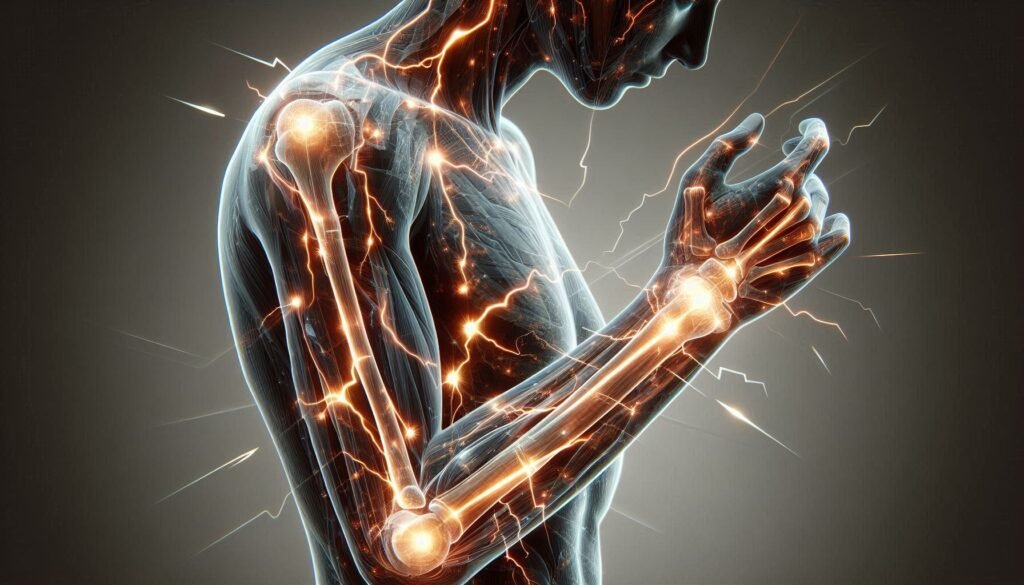Hormonal imbalances can have surprising effects on our bodies, often manifesting in ways we might not expect. One such symptom is paresthesia, a condition characterized by tingling, prickling sensations or numbness that commonly affects the extremities. While it may seem like a simple nerve issue at first glance, the underlying causes can be deeply rooted in our hormonal health.
The endocrine system plays a crucial role in regulating hormones that influence numerous bodily functions, including nerve sensitivity and overall neurological health. When hormones go awry—whether due to stress, lifestyle factors, or natural life changes—the consequences can ripple through various systems of the body. Understanding how these hormonal fluctuations contribute to paresthesia is essential for those seeking relief from this perplexing symptom.
Join us as we delve into the intricate relationship between hormonal imbalances and their effect on paresthesia. By exploring different hormones and their impacts on nerve function, you’ll gain valuable insights into why your body feels the way it does and what steps you may take toward better management of your symptoms.

The Endocrine System: An Overview of Hormones and Nerve Function
The endocrine system is a complex network of glands that produce and secrete hormones into the bloodstream. These hormones act as messengers, regulating various bodily functions including metabolism, growth, and mood. They also play a vital role in nerve function.
Hormones interact with receptors on target cells, influencing how those cells respond to stimuli. This interaction is crucial for maintaining homeostasis within the body. When hormonal levels are balanced, everything runs smoothly; however, even slight imbalances can lead to significant issues.
Nerve function relies heavily on proper hormonal signaling. Hormones such as thyroid hormone influence nerve conduction speed and responsiveness. Any disruption in these levels can directly affect how nerves communicate with each other and with muscles.
Understanding this interplay between hormones and nerve health highlights why monitoring hormonal balance is essential for overall well-being. Disruptions may not only cause metabolic or emotional issues but also manifest physically through sensations like tingling or numbness.
Thyroid Hormones: How Imbalances Lead to Paresthesia
Thyroid hormones play a crucial role in regulating the body’s metabolism and maintaining overall health. An imbalance, whether due to hypothyroidism or hyperthyroidism, can lead to various physical symptoms, including paresthesia. This sensation often manifests as tingling or numbness in the extremities.
Hypothyroidism occurs when the thyroid gland is underactive, leading to insufficient hormone production. Reduced levels of these hormones can slow nerve function and impair circulation, which may cause feelings of pins and needles in hands and feet.
Conversely, hyperthyroidism results from an overactive thyroid that produces excess hormones. This condition can heighten sensitivity in nerves and trigger sensations like burning or prickling.
Individuals experiencing unexplained paresthesia should consider getting their thyroid levels tested. Addressing hormonal imbalances through proper medical intervention could alleviate uncomfortable neurological symptoms associated with both conditions.
Estrogen and Progesterone: Fluctuations and Neurological Symptoms
Estrogen and progesterone are vital hormones in the female body, playing essential roles beyond reproduction. Their levels fluctuate throughout a woman’s life, particularly during menstrual cycles, pregnancy, and menopause. These fluctuations can significantly impact various bodily functions, including neurological health.
As estrogen levels rise and fall, women may experience different symptoms affecting their nervous system. Some report sensations like tingling or numbness—common signs of paresthesia. A drop in estrogen can lead to increased anxiety or mood swings that further complicate nerve function.
Progesterone also contributes to maintaining a balanced nervous system environment. Low progesterone levels might exacerbate feelings of stress or tension, which could translate into nerve-related symptoms such as burning sensations in extremities.
Understanding this hormonal interplay is crucial for recognizing how these changes may manifest physically. Addressing hormonal imbalances through lifestyle adjustments or medical interventions can help alleviate these uncomfortable neurological symptoms over time.
Testosterone Levels and Their Impact on Nerve Health
Testosterone plays a crucial role in maintaining nerve health. This hormone is not only essential for muscle mass and libido but also influences the nervous system’s functionality. Low testosterone levels can lead to various neurological symptoms, including paresthesia.
Research shows that testosterone affects the expression of neuroprotective factors. These factors help maintain healthy neurons and support overall cognitive function. When testosterone is deficient, it may contribute to conditions like neuropathy, leading to sensations such as tingling or numbness.
Men experiencing hormonal imbalances often report increased instances of paresthesia. This relationship underscores the importance of monitoring testosterone levels as part of a broader assessment for neurological issues. Addressing low testosterone could alleviate some of these uncomfortable sensations.
Moreover, restoring optimal testosterone levels through lifestyle changes or medical interventions can significantly improve nerve function. Understanding this link between hormones and nerve health empowers individuals to seek appropriate treatments when needed.
Cortisol: The Stress Hormone’s Role in Paresthesia
Cortisol, often referred to as the stress hormone, plays a crucial role in the body’s response to stress. Produced by the adrenal glands, it helps regulate various functions such as metabolism and immune response. However, prolonged elevated levels of cortisol can lead to several health issues.
One significant impact of high cortisol is its effect on nerve function. Chronic stress may cause inflammation and alter blood flow, leading to sensations such as tingling or numbness—common symptoms of paresthesia. These changes can disrupt normal nerve signaling.
Additionally, cortisol influences other hormones that are vital for maintaining overall balance in the endocrine system. When these hormones are affected, it further exacerbates neurological symptoms and discomfort.
Managing cortisol levels through relaxation techniques like yoga or meditation can be beneficial. Addressing chronic stress not only aids in reducing feelings of anxiety but also promotes better nerve health and lessens paresthesia episodes over time.
Growth Hormone Deficiency and Its Neurological Effects
Growth hormone deficiency (GHD) can have significant impacts on various bodily functions, including neurological health. This hormone is crucial for growth, metabolism, and tissue repair. When levels fall short, it can lead to a range of symptoms that extend beyond physical development.
Individuals with GHD often report cognitive difficulties such as memory loss and reduced concentration. These issues may stem from impaired brain function due to insufficient energy supply or nutrient absorption linked to low growth hormone levels.
Neuropathies are another concern associated with GHD. Patients might experience paresthesia—tingling or numb sensations—in different body parts. This occurs when the lack of adequate hormonal support affects nerve repair and regeneration processes.
Moreover, emotional well-being can also be impacted by GHD. Common feelings of fatigue, depression, and anxiety may arise due to hormonal imbalances affecting neurotransmitter levels in the brain.
Menopausal Hormonal Changes and Paresthesia
Menopause marks a significant transition in a woman’s life, resulting from hormonal fluctuations that can have diverse effects on the body. During this phase, estrogen and progesterone levels drop sharply. These changes not only trigger common symptoms like hot flashes and mood swings but can also lead to neurological issues such as paresthesia.
Many women report experiencing sensations like tingling or numbness during menopause. This is often linked to the declining hormone levels affecting nerve function and blood flow. Estrogen plays a critical role in maintaining healthy nerve signaling, so its decrease may contribute to these uncomfortable feelings.
Moreover, hormonal imbalances can worsen existing conditions such as diabetes or vitamin deficiencies, further increasing the risk of paresthesia. Women with pre-existing health issues should pay close attention to any new or worsening symptoms during this time.
Regular check-ups with healthcare providers are essential for managing menopausal symptoms effectively. Exploring lifestyle modifications alongside medical interventions may help alleviate some of these distressing sensations related to hormonal changes.
Diagnosing Hormone-Related Paresthesia: Tests and Evaluations
Diagnosing hormone-related paresthesia involves a careful and thorough assessment by healthcare professionals. Patients typically start with a detailed medical history, focusing on symptoms, lifestyle factors, and any family history of hormonal disorders.
Blood tests are essential to evaluate hormone levels. Common tests include measuring thyroid hormones, estrogen, progesterone, testosterone, cortisol, and growth hormone. These results help determine if imbalances are contributing to neurological symptoms like numbness or tingling sensations.
Neurological examinations may also be conducted to assess nerve function. This can involve testing reflexes and sensory capabilities to pinpoint areas affected by paresthesia. Imaging studies such as MRI or CT scans might be recommended in certain cases to rule out other potential causes.
Collaboration between endocrinologists and neurologists enhances the diagnostic process. Their expertise ensures that both hormonal imbalances and neurological issues receive appropriate attention for effective management of paresthesia symptoms.
Treatment Options: Hormone Replacement and Alternative Approaches
Hormonal imbalances can significantly contribute to paresthesia, but various treatment options are available. Hormone replacement therapy (HRT) is a common approach, especially for those experiencing significant fluctuation in hormones like estrogen and testosterone. HRT aims to restore hormone levels to alleviate symptoms related to nerve function.
Alternative approaches also hold promise. Natural supplements such as omega-3 fatty acids, vitamin D, and magnesium may support nerve health and help balance hormones. Lifestyle adjustments—like regular exercise and a balanced diet—can promote overall hormonal equilibrium.
Acupuncture has gained popularity as an alternative method for managing paresthesia caused by hormonal changes. This traditional practice focuses on stimulating specific points in the body to improve energy flow, potentially easing neurological symptoms.
Mindfulness practices such as yoga or meditation can reduce stress-related cortisol fluctuations that impact nerve health. Integrating these methods into daily routines may provide additional relief from the effects of hormonal imbalances on paresthesia without relying solely on medication.
Lifestyle Factors: Balancing Hormones Naturally to Reduce Paresthesia
Balancing hormones naturally can significantly impact the management of paresthesia. Lifestyle factors play a crucial role in stabilizing hormonal levels and promoting overall well-being.
A balanced diet rich in whole foods, healthy fats, and lean proteins supports optimal endocrine function. Incorporating omega-3 fatty acids found in fish or flaxseeds may help reduce inflammation that contributes to nerve issues. Regular physical activity is essential as it boosts hormone production and improves circulation, ensuring nutrients reach nerves effectively.
Stress management techniques like yoga, meditation, or deep breathing exercises are vital for regulating cortisol levels. High stress can exacerbate hormonal imbalances leading to symptoms such as tingling or numbness. Prioritizing sleep also cannot be overlooked; quality rest allows the body to repair itself and maintain hormonal equilibrium.
Hydration is key too—dehydration can disrupt various bodily functions including nerve health. Consider regular check-ups with healthcare providers who specialize in hormone health for personalized advice.
By embracing these lifestyle changes, individuals may not only alleviate their paresthesia but also enhance their overall quality of life through improved hormone balance.


